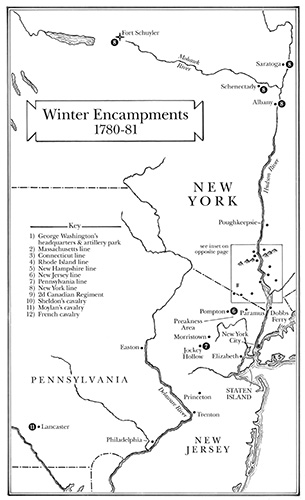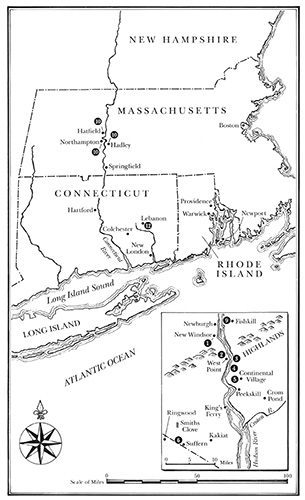General Orders, 6 May 1781
General Orders
Head Quarters New Windsor Sunday May 6th 1781
Parole Countersigns——
John Powel soldier in the New Hampshire line who was tried by a General Court martial the 27th of April and sentenced to suffer death which Sentence was approved and published in Orders the 30th of April is ordered to be executed on Friday next the 11th instant.1
Varick transcript, DLC:GW.
GW had established his winter headquarters at New Windsor in early December 1780. He commanded from there until moving his army in early summer to near Peekskill (see GW to William Heath, 28 Nov. 1780, n.5; General Orders, 19 June 1781; and , 3:382). The Connecticut, Massachusetts, New Hampshire, and Rhode Island regiments had wintered in the vicinity of West Point. Six companies of Col. Goose Van Schaick’s 1st New York Regiment later came from Albany to join these troops (see GW to James Clinton, 16 Feb.; see also GW to Heath, 3 March, and n.1 to that document). The Canadian Old Regiment guarded supplies at nearby Fishkill. Following suppression of a mutiny in their ranks, the two New Jersey Regiments occupied posts in the northern part of that state (see Israel Shreve to GW, 20 Jan., source note, and GW to the Officer Commanding the New Jersey Brigade, 7 Feb.). The 2d Regiment of Continental Dragoons remained near Springfield, Mass., and Col. Stephen Moylan’s 4th Continental Dragoons prepared at Lancaster, Pa., to join Major General Lafayette’s light infantry detachment, which GW had ordered to Virginia (see GW’s second letter to Lafayette, 20 Feb., source note, and GW to Samuel Huntington, 27 Feb.; see also Lafayette to GW, 24 May). A congressional order also sent the Pennsylvania line, which had dissolved following its mutiny, to the southern department. Slow recruiting delayed the line’s reformation and departure (see Huntington to GW, 20 Feb.; GW to Arthur St. Clair, 26 Feb.; and St. Clair to GW, 2 March; see also Anthony Wayne to GW, 2 Jan., source note).
Assistance with GW’s correspondence during the weeks covered in this volume came from aides-de-camp Tench Tilghman, David Humphreys, and David Cobb (for Cobb, see General Orders, 15 June). Lt. Peregrine Fitzhugh also served as an extra aide-de-camp (see General Orders, 2 July). Jonathan Trumbull, Jr., began officially as GW’s secretary on 8 June (see the general orders for that date; see also Trumbull to GW, 10 May). Lt. Col. Richard Varick became GW’s recording secretary and also helped with general correspondence (see GW to Varick, 25 May). Lt. William Colfax, commander of GW’s guards, handled GW’s money for army expenses and assisted occasionally with correspondence. GW’s staff collectively was known as his “family” (see, for example, Lafayette to GW, 8 May, postscript, and Nathanael Greene to GW, 23 June).
1. The court-martial had found John Powell guilty of desertion (see General Orders, 30 April; see also Heath to GW, 5 May, postscript).
Humphreys wrote Capt. Daniel Livermore from headquarters on 11 May with orders “to take the said John Powell from the place of his present confinement and carry him to the place appointed for his execution and there hang him by the

Map 1. GW had established his winter headquarters at New Windsor in early December 1780 and commanded from there until early summer, when

he moved his army across the Hudson River and southward to Peekskill. (Illustrated by Rick Britton. Copyright Rick Britton 2022)
neck till he be dead, for which this shall be your Sufficient Warrant” (, 3:72).

![University of Virginia Press [link will open in a new window] University of Virginia Press](/lib/media/rotunda-white-on-blue.png)
